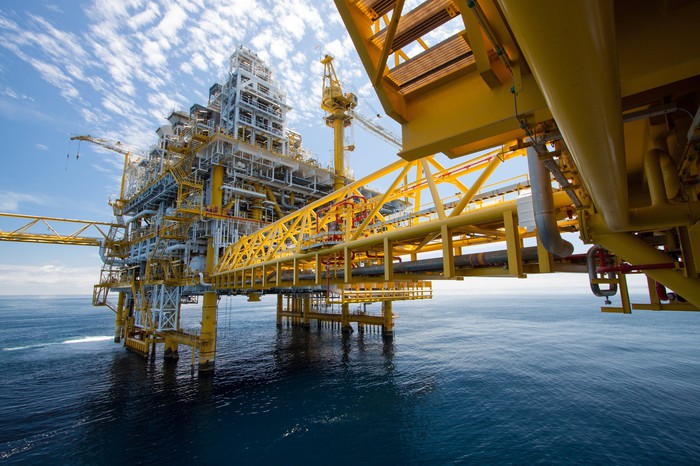Few investors have a more impressive track record than Berkshire Hathaway$Berkshire Hathaway(BRK.B)$ $Berkshire Hathaway(BRK.A)$CEO Warren Buffett. Since taking the reins in 1965, he's created roughly $690 billion in value for his shareholders and delivered an aggregate return for his company's Class A shares of more than 3,600,000%!
Although there area number of reasonsfor the Oracle of Omaha's success over nearly six decades, it's his portfolio concentration that really stands out. Buffett has long believed that diversification is only necessary if you don't know what you're doing.
Despite Buffett's company having stakes in more than four dozen securities, 91% of Berkshire Hathaway's $347.6 billion investment portfolio,including holdings from New England Asset Management, is tied up in the following four sectors, as of June 1, 2022.
Information technology: 42.43% of invested assets
Considering that Warren Buffett has never been much of atech stockbuff, you might be surprised to learn that more than 42% of Berkshire's assets ($147.3 billion) are collectively invested in five information technology companies. Then again, the vast majority of this investment ($135.5 billion) belongs to Apple$Apple(AAPL)$ (NASDAQ: AAPL).
Buffetthas long viewed Apple as one of Berkshire Hathaway's pillars. It has a well-known brand, exceptionally loyal customer base, and has leaned on its innovative capacity to generate successively higher sales and profits for more than a decade. As of the first quarter, Apple's 5G-capable iPhone accounted for 50% of U.S. smartphone market share, according to data from Counterpoint Research.
However, Apple's future is less product-oriented and more focused on subscriptions. CEO Tim Cook is overseeing this transition, which should help reduce the revenue lumpiness associated with product replacement cycles every couple of years. It also doesn't hurt that subscription service are capable of substantially higher operating margins than traditional products, such as smartphones and laptops.
In addition to Apple, the other big tech play is gaming company Activision Blizzard$Activision Blizzard(ATVI)$ (NASDAQ: ATVI). During Berkshire Hathaway's annual shareholder meeting, Buffett made clear that the company's Activision position, currently worth $5.7 billion,is an arbitrage opportunitygiven Microsoft$Microsoft(MSFT)$ 's all-cash offer for the company at $95 per share. It's not often the Oracle of Omaha and his investing team aim to scalp a few dollars on a trade, but that's exactly what Berkshire's Activision position amounts to.
 Financials: 25.86% of invested assets
Financials: 25.86% of invested assets
On the contrary, the financial sector is usually Warren Buffett's favorite arena to put his company's money to work. Berkshire Hathaway currently has $89.8 billion (close to 26% of invested assets) spread across 14 differentfinancial stocks. Note, this doesn't include exchange-traded funds.
The bulk of Berkshire's financial stock investments are tied up in Bank of America$Bank of America(BAC)$ (NYSE: BAC)and American Express$American Express(AXP)$ (NYSE: AXP). BofA and AmEx are, respectively, the No. 2 and 5 holdings by market value, with a combined $63 billion invested in both companies.
There are multiple reasons Buffett loves bank stocks like BofA. For starters, banks are cyclical, and will therefore benefit over the long run from the natural expansion of the U.S. economy. Bank of America is alsothe most interest-sensitive of the big banks. With the Federal Reserve aggressively tackling inflation and rapidly increasing interest rates, no large bank will see a bigger lift to net interest income over the next 12 months than BofA.
Meanwhile, American Express is Berkshire Hathaway's second-longest continuous holding (29 years). AmEx gets the liberty of double dipping during periods of economic expansion. It generates fees from merchants by acting as a processor, and is able to bring in interest income and fees from its cardholders.
Both Bank of America and American Express have sizable capital return programs, too. An easy way for a time-tested and profitable business to win over Warren Buffett is to pay a regular dividend and repurchase its common stock.
 Consumer staples: 11.64% of invested assets
Consumer staples: 11.64% of invested assets
The third most-represented sector in Berkshire Hathaway's portfolio isconsumer staples. Although Buffett and his team have a little over $40 billion collectively invested in five consumer staples companies, the 11.6% weighting for this sector is its lowest in at least 21 years. My suspicion is that historically low lending rates have encouraged Buffett and his team to get a bit more aggressive with their investments and shy away from generally slow-growing consumer staples stocks over the past couple of years.
Over 60% of the $40 billion tied up in the consumer staples sector comes courtesy of the 400 million shares of beverage giant Coca-Cola$Coca-Cola(KO)$ (NYSE: KO)that Buffett's company holds. Coke is Berkshire's longest-tenured holding(34 years) and is unlikely to be sold or pared down anytime soon.
The Oracle of Omaha has always been attracted to businesses with strong brands that can perform well in virtually any economic environment. Coca-Cola has, arguably, the strongest brand recognition of any consumer goods brand, and is operating in all but three countries worldwide (Cuba, North Korea, and Russia -- the latter of which is due to its invasion of Ukraine).
Coca-Cola also happens to be riding a 60-year streak of increasing its base annual dividend. Based on Berkshire's roughly $3.25 cost basis for shares of Coke, as well as Coca-Cola's $1.76 base annual payout, Buffett's company isnetting a cool 54% yield relative to cost each year. That alone is enough to keep Buffett and his investing team quite happy.
 Energy: 10.99% of invested assets
Energy: 10.99% of invested assets
Lastly, Warren Buffett increased his company's stake inenergy stocksfrom a little over 1% to end 2021 to almost 11% five months later. Berkshire only owns two energy stocks, but has a combined $38.1 billion invested in this duo.
First up is integrated oil and gas company Chevron$Chevron(CVX)$ (NYSE: CVX), which accounts for a little over $28 billion of Berkshire Hathaway's invested assets. The Oracle of Omahapiled into Chevron during the first quarter, likely signaling his expectation that oil and natural gas prices will remain elevated for the foreseeable future. Russia's invasion of Ukraine, as well as a lack of domestic oil and gas investment during the pandemic, could make it difficult to significantly increase the supply of either commodity anytime soon.
Don't overlook the "integrated" aspect of Chevron's operations, either. If crude and gas prices should fall, the company can lean on its midstream (i.e., transmission pipelines and storage) or downstream (i.e., refineries and chemicals) operations as a hedge.
Comments